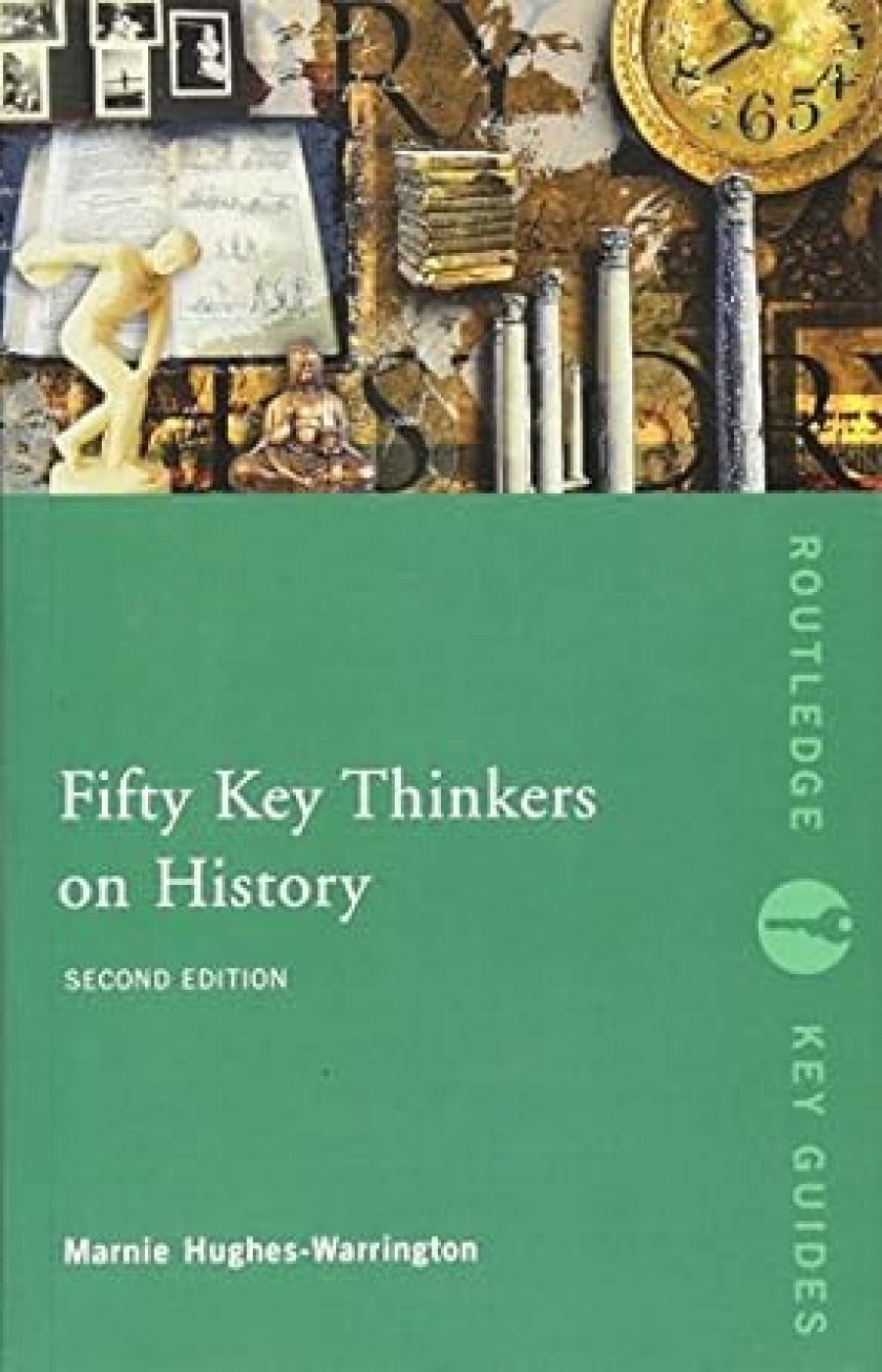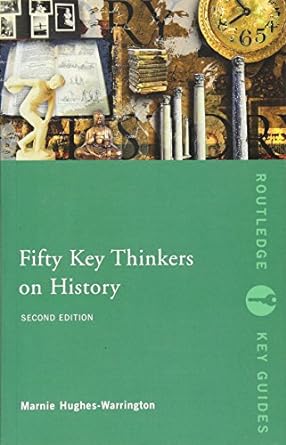
- Free Article: No
- Custom Article Title: Anything goes
- Review Article: Yes
- Article Title: Anything goes
- Online Only: No
- Custom Highlight Text:
Written by Marnie Hughes-Warrington, of Macquarie University, this is essentially a text for both students and teachers studying ‘historiography’, which, according to my dictionary, is writing about history, rather than historians ‘making’ history, as is sometimes said here. Enthusiasm for the first edition of Fifty Key Thinkers on History (2000) has brought forth this new edition and shifted its emphasis more towards ‘historiography’. Indeed, a new introduction – ‘What Is Historiography?’ – suggests four different approaches to the subject.
- Book 1 Title: Fifty Key Thinkers on History
- Book 1 Subtitle: Second Edition
- Book 1 Biblio: Routledge, $48 pb, 442 pp
- Book 1 Cover Small (400 x 600):

- Book 1 Cover (800 x 1200):

Also emphasising the shift, four key thinkers from the first edition have been dropped and replaced by four others. Sheila Rowbotham, who wrote about the struggles of the working classes, women as well as men, and Carter G. Woodson, who pioneered what was then called ‘negro’ history in the United States in the 1920s and founded the Journal of Negro History, have given way to more obvious modern ‘historiographers’ Keith Jenkins and Richard J. Evans. Francis Fukuyama, ‘unpopular among historians’ for writing of ‘the end of history’, has gone. So has Manning Clark, the token Australian in the first edition. Clark may have been making history by the controversies he generated, but his ‘historiography’ was less than theoretically rigorous. Instead, we now have Christine de Pizan, who lived in the thirteenth century, proving that women were thinking about history long before Natalie Zemon Davis and Joan Wallach Scott, the only other women thinkers among the fifty. Friedrich Nietzsche, who was omitted earlier on the grounds that he had been adequately covered in Fifty Key Philosophers, has also been included. The preface, reprinted now as the ‘Introduction to the First Edition’, has been altered to take account of the changes, and the internal cross-referencing has been updated, though imperfectly (Rowbotham survives as a ‘see also’ under E.P Thompson). Dates are now given in the modern form as BCE and CE though the odd AD remains; and an index has been added.
The fifty names have been chosen not as an attempt to create a canon, but because they present a variety of approaches to history, are challenging or may ‘inspire dispute’. The list begins chronologically with Herodotus, Thucydides, Polybius and the Chinese historian Sima Qian. It ends with Emmanuel Le Roy Ladurie, Joan Scott and the new entries, Jenkins and Evans. Most entries contain a short biography and a brief exposition of the work or the ideas, followed by a list of major works and ‘Further Resources’. About a fifth of the entries are what we used to call philosophers of history with little or no practical experience of actually researching or writing history. Working historians such as G.R. Elton, E.H. Carr or Le Roy Ladurie, who produced many volumes of history, in addition to a ‘what is history’ type of essay, seem to me to make more sense about the real problems faced by historians, but I am not sure they are thus regarded by the professional historiographers.
About a third of the way down the chronological list comes Leopold von Ranke (1795–1886), generally seen as the founder of modern ‘professional’ history for advocating systematised training for historians and exhaustive archival research. Before Ranke, history was usually a chronicle, or a record, written by people who were involved, or who wanted to provide an intelligible account of what had happened. The drive to systematise existing knowledge that gave us modern scientific classification of knowledge was also applied to historical evidence and events. By the end of the nineteenth century, the study of history was seen not only as the best way of training future bureaucrats and administrators, but also as the best way of preparing young, ignorant or inexperienced persons for a useful life by exposing them to the range of human behaviours and dilemmas. Thus history could be treated as a kind of social and moral laboratory in which real-life problems and possible solutions could be studied without damage to any of the participants.
Later, it became clear that this kind of history was rather remote to most children, unless it came packaged as simple moral tales. As well, the difficulties of selection from masses of evidence, the near impossibility of maintaining objectivity, and the fact that the historian uses many of the same writing skills as the novelist made history a nightmare for those who desired a uniform curriculum, uniformly taught. So there has been a retreat from history in education. Geoffrey Elton (born Gottfried Ehrenberg), who became a leading historian of Tudor and Stuart England, and Regius Professor of Modern History at Cambridge, said not long before his death in 1994 that history had become a case of ‘anything goes’, and ‘the intellectual equivalent of crack’. In Elton’s view, historians had been disabled by their own philosophical preoccupations and left with nothing to study but historiography. So here we are.
As a footnote – and what historian can resist one? – the only Australian names surviving in this edition are passing references to Greg Dening and Keith Windschuttle, with three others among the references, two of them long-term expatriates. However, the entry on American Frederick Jackson Turner notes that his ideas about the frontier were ‘even applied to Australian, African and Russian history’. Interested readers might care to check the last chapter of Russel Ward’s celebrated account of mateship in Australian history, The Australian Legend (1958), for his discussion of Turner in Australia, and follow through to Miriam Dixson’s The Real Matilda: Women and Identity in Australia, 1788 to the Present (1976), and Henry Reynolds’s The Other Side of the Frontier: Aboriginal Resistance to the European Invasion of Australia (1981), both of which tackled aspects of the frontier that Turner is criticised for ignoring.


Comments powered by CComment